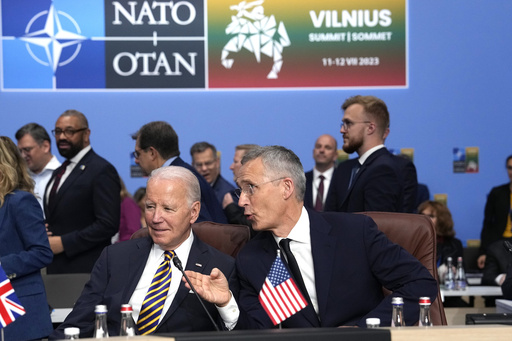European leaders attending the NATO summit in Washington are facing uncertainty regarding President Joe Biden’s potential reelection. As the military alliance marks its 75th anniversary, concerns arise about the return of former President Donald Trump, a vocal critic of NATO, to power. Biden, who has strengthened alliances to aid Ukraine against Russia’s aggression, praises NATO’s current unity.
Behind the scenes, discussions revolve around preparations for potential divisions if far-right forces antagonistic to NATO gain power in countries like the U.S. and France. European governments are considering strategies to safeguard NATO, ensure support for Ukraine, and uphold security in NATO member states in case of a Trump victory.
Termed as “Trump-proofing” or “future-proofing” NATO, European nations are strategizing to maintain the alliance’s stability amidst political shifts. The ongoing NATO summit, initially intended as a commemoration of NATO’s resilience, now appears somber due to Russian advancements and the rise of far-right governments critical of NATO.
Amid concerns that Trump might withdraw the U.S. from NATO, European officials emphasize the importance of sustaining Western military aid for Ukraine and preparing for potential decreases in U.S. support. NATO allies aim to counterbalance any reduction in U.S. involvement by strengthening their own defense capabilities.
Discussions at the summit include the possibility of NATO assuming a greater role in coordinating assistance for Ukraine’s military forces. European countries are also coordinating statements to deter Russian aggression against Ukraine by imposing significant sanctions even if the U.S. shifts its stance.
Additionally, there are talks about European nations playing a more substantial role in NATO’s nuclear deterrence to offset a potential decline in U.S. contributions. However, due to limitations in military budgets and capabilities, European countries are not yet ready to fill the void left by the U.S. if it were to reduce its NATO commitments.
While European allies express willingness to support NATO and Ukraine independently of U.S. involvement, experts caution that the idea of completely safeguarding American commitments under different administrations may be impractical. Concerns persist over the unpredictable nature of U.S. foreign policy decisions and the impact on NATO’s future stability.
This website uses cookies so that we can provide you with the best user experience possible. Cookie information is stored in your browser and performs functions such as recognising you when you return to our website and helping our team to understand which sections of the website you find most interesting and useful.
